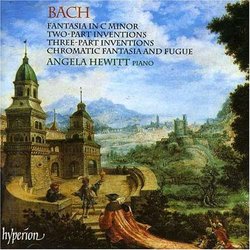| All Artists: Johann Sebastian Bach, Angela Hewitt Title: Bach: Fantasia in C minor; Two-Part Inventions; Three-Part Inventions; Chromatic Fantasia & Fugue Members Wishing: 0 Total Copies: 0 Label: Hyperion UK Release Date: 8/30/1994 Album Type: Import Genre: Classical Styles: Forms & Genres, Fantasies, Symphonies, Historical Periods, Baroque (c.1600-1750) Number of Discs: 1 SwapaCD Credits: 1 UPC: 034571167466 |
Search - Johann Sebastian Bach, Angela Hewitt :: Bach: Fantasia in C minor; Two-Part Inventions; Three-Part Inventions; Chromatic Fantasia & Fugue
 | Johann Sebastian Bach, Angela Hewitt Bach: Fantasia in C minor; Two-Part Inventions; Three-Part Inventions; Chromatic Fantasia & Fugue Genre: Classical
|
Larger Image |
CD Details |
CD ReviewsThe first of Hewitt's monumental Bach cycle Alan Lekan | Boulder, CO | 03/25/2006 (5 out of 5 stars) "In 1994 a mostly unknown 'Canadian' pianist signed with Hyperion Records to begin recording the whole of Bach's keyboard works. Eleven years - and some 14 discs later - the dream was complete, but the pianist was now well known and respected as one of the great Bach interpreters of her generation. This CD was the first of these recordings and the logical place to begin. The program here ranges from the more simple of Bach's compositions (Two-Part Inventions) to some of the more trecherous, virtuostic masterpieces (the two fantasias). Written by Bach for his son and students around 1723, the Two-Part and Three-Part Inventions form the foundational know-how and skills of Bach's countrapuntal keyboard art. For centuries now these works have been essential for any piano student learning the "basics" of figuration, melodic line, smooth legato, clarity of two and three voices and so on. The Three-Part pieces are fairly advanced pieces possessing complex voicing and passagework. As such they are pre-requisite for learning the more complex preludes and fugues of "The Well-Tempered Clavier." Like the pieces in the WTC, both sets of Inventions show Bach as both a master educator and deft lyricist with their range of emotive qualities. There is delicacy, pensiveness, vivacity, virtuosity and sorrow expressed in these miniatures - all while building the foundational skills (like seamless legato w/o use of the pedal) necessary for performing the major piano repertoire. Pianists worldwide owe a world of gratitude for Johann Sebastian Bach for such foundational compositions which have been reverently played by many of the great composers who followed Bach. I'm not sure if it is more Bach's multi-faceted compositions or Miss Hewitt's varied and expressive playing of them, but these so-called "piano excercises" sound anything but that. Likely, it is both of the above factors. It was in this first recording that Hewitt showed the music world her ever-so delicate, poised and artistic pianistic mannerisms, transforming these student pieces into delightful little concert performances in themselves. Her readings are worthy role models for students focusing on the long, clear, lyrical line that is essential to Bach's music as well as rewarding to admirers of Bach's art. Perhaps what Miss Hewitt most brings to this music is her tasteful, expressive nuances: a subtle rubato, an enticing dynamic shading and an artistic variety of tone summoned forth from her Steinway Grand. Such qualities create more of an unfolding story within each piece than showcasing mere "finger dexterity exercises." Gramophone recognized this more sensitive tunement to the musical aspects too and gave this CD a solid recommendation. If the Inventions are the "main course" of this set, then the two virtuostic Fantasias which open and close the program are the delectable "appetizer" and "dessert" on the menu. Both show Bach as master of the extemporaneous "Style Fantasticus" that he most likely gleaned in his youth from his visit to hear the great organist, Buxtahude. Even in Bach's day supposedly, the great Chromatic Fanasia in D-minor was among his most popular piece as it is today. Both are exciting, daunting works played to perfection by Hewitt. As noted by Gramophone, "her readings of the fantasias are as eloquent and stimulating as any yet recorded by a harpsichordist." Also in support of the pianist is a fine recording ambiance by Hyperion that is hard to fault. Its rather ironic that this first CD of Hewitt's Bach recordings was the last of her entire discography I acquired. But even after hearing all her glorious performances of Bach's music - from the WTC and Goldbergs to the Toccatas, Suites and Keyboard Concertos - hearing these earliest and more straightforward pieces still brings great refreshment and satisfaction that is so common in Bach's music - and so common too in Angela Hewitt's masterful and colorful playing of them. Compositions - 4.5 stars, Peformance - 5 stars, Sound - 4.5 stars." Rushed Playing, Not My Favorite Bach MezzoInTraining | Ottawa, ON Canada | 08/23/2008 (2 out of 5 stars) "There is a deeply spiritual quality in Bach's music, that brings me closer to heaven every time I listen. This quality is present with such abundance in the Bach of the elderly Arrau and Kempff, that the music reached deeply into my soul and put me into tears at time.
IMHO, it takes a very refined sense of control to balance the multiple voices in Bach's polyphonic keyboard music. On one hand, each line needs to be given its due independence and prominence, and yet, at the same time, together they should sound "at peace" with one another harmonically. Hewitt's playing is usually muddy in the bass lines (as compared to the clarity achieved by Glenn Gould, Arrau or Kempff, the latter two even did it on unmodified pianos). Hewitt's playing also lacks the fore-mentioned finesse control, that caused the louder passages to sound "noisy" and "nervous". Also, while her phrasing is usually very good, her shaping may be considered overdone for Baroque keyboard music." |

 Track Listings (33) - Disc #1
Track Listings (33) - Disc #1